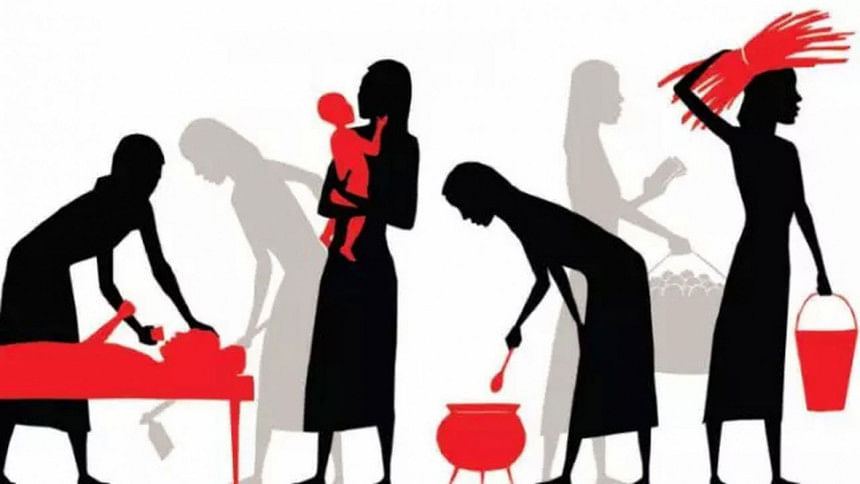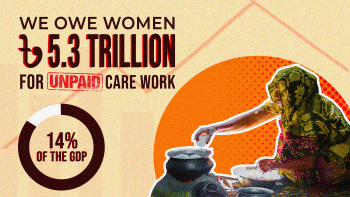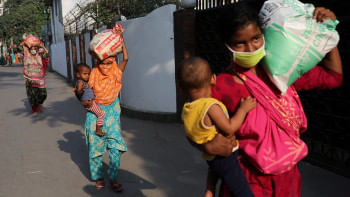What if we finally recognised women's unpaid care work?

In 1929, Virginia Woolf, in her renowned essay A Room of One's Own, raised the issues of economic and social barriers faced by women, including their unpaid labour. Though her primary focus was on women's intellectual and artistic potential, she implicitly addressed this issue by highlighting women's economic independence and financial resources. However, she was not the first to bring this concern to light.
American sociologist and novelist Charlotte Perkins Gilman wrote extensively about women's economic independence. In her 1898 book Women and Economics, she argued that women's dependence on men for economic support due to unpaid household labour was detrimental to their status and freedom. Another influential figure, British social reformer and economist Beatrice Webb, worked in the late 19th and early 20th centuries on issues of women's labour and the conditions of the working class. While her focus was not specifically on unpaid household labour, her broader social and economic reforms were relevant to understanding women's roles in the economy.
Canadian economist Margaret Reid conducted the first systematic economic analysis of unpaid household labour with her 1934 book Economics of Household Production. Her work laid the foundation for incorporating household labour into economic theory and measurement. Here, we refer to cooking, cleaning, and looking after poultry and livestock, etc. as unpaid household work, and taking care of children, elderly, and other family members as care work.
Although historically undervalued and overlooked in traditional economic analyses, there has been a significant amount of literature on unpaid household and care work over the past three decades, both from local and global perspectives. Notably, a 2015 study conducted by the Centre for Policy Dialogue (CPD) and Manusher Jono Foundation (MJF), titled "Women's Unaccounted Work and Contribution to the Economy", estimated the value of women's unpaid work in Bangladesh as 76.8 percent of the GDP in the fiscal year 2013-14 (on condition). It found that a female member in a household undertakes 12.1 non-SNA (System of National Accounts) activities in a day—activities not included in the national GDP—compared to only 2.7 activities for a male member.
In 2019, Oxfam and the International Labour Organization (ILO) released reports on the global perspective of unpaid work. Oxfam's study revealed that unpaid work done by women worldwide amounts to a staggering $10.8 trillion a year, 43 times the annual turnover of the world's biggest company, Apple. ILO's report "Unpaid Care Work and the Labour Market" found that the value of unpaid care work is approximately $11 trillion, accounting for around 9 percent of global GDP. Without exception, women carry out 75 percent of unpaid care work, which is 88 percent in Bangladesh.
The issue gained further attention last year when Prime Minister Sheikh Hasina asked the Planning Commission, through the Bangladesh Institute of Development Studies (BIDS), to determine the actual contribution of women's unpaid household and care work to GDP. BIDS presented its findings (15 percent contribution to GDP) at its last Annual BIDS Conference on Development (ABCD) in December.
As a part of my regular editing job, reading an article in the Bangladesh Development Studies (BDS) journal titled "Economic Valuation of Women's Unpaid Household Service Work in Bangladesh," which detailed the study led by Dr Binayak Sen, sparked my interest in writing on this issue. Using the 2021 Time-Use survey by the Bangladesh Bureau of Statistics (BBS) and BIDS survey of 64 villages in 2023, the authors calculated that women's contribution to GDP through unpaid non-market household and care work is about 15 percent. If unpaid work for both women and men were reflected in national accounting, violating the SNA rule set by the UN, it would add approximately 17.6 percent to Bangladesh's GDP.
Unpaid household and care work are crucial for developing the next generation's skills and knowledge, essential for a productive workforce. It strengthens family and community bonds, fostering social stability and reducing social strife. It also allows other family members to participate in the formal paid workforce, boosting overall economic productivity and ensuring the population's physical and mental well-being.
If unpaid household and care work were replaced by market services, it would significantly increase GDP; preventive and routine care at home reduces the burden on public healthcare systems, and parental involvement in education can improve outcomes, reducing the need for remedial education. When societal structures support unpaid household work, it enables higher female participation in the labour force, boosting economic growth. The indirect benefits of unpaid work can lead to increased productivity and economic activity in other sectors.
So, unpaid household and care work being the buzzwords, if the UN does agree to include it in the SNA and the world follows accordingly, some questions may arise: will we still not be satisfied with this crucial work they are doing? Will we value the work they do in agriculture, like livestock or poultry rearing?
The BIDS article suggests as policy implication that male contribution to household unpaid care work should be societally encouraged. This will help ensure—the article reads—the spread of care work across genders, ensuring gender equality in unpaid work. I do agree, but did we keep it in mind that people engaged in the formal labour force may end up working a "double shift" of paid and unpaid work, which has serious consequences for their health and well-being?
Wrapping up (leaving the questions) with a quote from Reid and another line from the BIDS article:
"The more we have concentrated on money values, the more we have overlooked that part of our economic system which is not organised on a profit basis."
Unpaid care work is an essential element of social reproduction—a process that supports individuals, families, and society to continue thriving.
Mohin Uddin Mizan is publication and communication professional at the Bangladesh Institute of Development Studies (BIDS), Ministry of Planning. He can be reached at [email protected]
Views expressed in this article are the author's own.
Follow The Daily Star Opinion on Facebook for the latest opinions, commentaries and analyses by experts and professionals. To contribute your article or letter to The Daily Star Opinion, see our guidelines for submission.

 For all latest news, follow The Daily Star's Google News channel.
For all latest news, follow The Daily Star's Google News channel. 








Comments